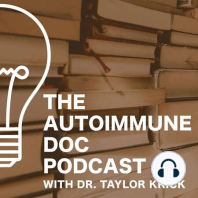30 min listen

023 - The Big 3 Pathogens - EBV, Lyme, and Mold
023 - The Big 3 Pathogens - EBV, Lyme, and Mold
ratings:
Length:
32 minutes
Released:
Sep 22, 2021
Format:
Podcast episode
Description
Pathogens and infections are related to autoimmune disease, we've established that over the past couple episodes. THESE 3 ARE THE MOST WELL-STUDIED AND CLINICALLY RELEVANT PATHOGENS - one virus, one bacteria, and one fungus. Epstein-Barr Virus causes infectious mononucleosis, or mono. EBV a a virus that can lie dormant for the rest of your life in the B cells of your immune system. If it remains dormant - no big deal! If it re-activates, it can be like awakening a sleeping giant. EBV infection is associated with several autoimmune diseases, most notably autoimmune thyroid diseases, Rheumatoid Arthritis, and Multiple Sclerosis. In this episode I talk about EBV, the relevant labs, and some of the prominent research connecting this virus to autoimmune diseases. Lyme disease is caused by Borrelia burgdorferi infection from a tick bite that disseminates into the blood stream and can get into the joints and the brain, causing a massive inflammatory response but at the same time suppressing the immune system in an attempt to evade it. Lyme can cause many chronic symptoms including joint pain, fatigue, and neurological complications. Lyme testing is controversial and sometimes hard to determine!Lyme and mold are both known as "biotoxins", meaning they are biological, living pathogens, but their effects are largely "toxic", as they affect the detox pathways such as the liver, bile ducts, lymph drainage, mitochondria, and more. Mold is the scariest of the 3 in my opinion for several reasons. For one it is very common in our indoor environments, most people I know have had some degree of water damage. Mold exposure can allow fungus to colonize our gut, sinuses, bladder, lungs, and then it can cause both an adaptive immune response (allergies and sensitivities) as well as an innate immune response and a chronic inflammatory response, which both have their own set of problems. This includes colonization of molds such as Aspergillus, Penicillium, Stachybotrys from indoor water damage, but also yeasts like Candida and even molds from outdoors like from decaying leaves. When molds "colonize" they often form biofilms that they can hide under and continue to grow, making it a hard to treat problem that often keeps getting worse. Molds also release toxins such as mycotoxins that damage mitochondria and cellular function and are highly neurotoxic. Because of all these reasons, I think mold is a HUGE problem with inflammatory conditions!!It's not impossible to have all 3 of these - a virus, a bacteria, and a fungus - all at the same time. Throw in a heavy metal and you can be having quite the symptom party!!!All of these things are really important, but it's also important to not put all of your eggs into any one basket. Just because you find Lyme, mold, or EBV doesn't mean there aren't other things that haven't been found. Keep the big picture in mind!
Released:
Sep 22, 2021
Format:
Podcast episode
Titles in the series (55)
014 - The Thyroid Puzzle - Mechanisms, Lab Ranges, and Most Common Patterns by The Autoimmune Doc Podcast w/ Dr. Taylor Krick